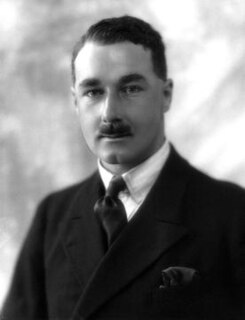Lieutenant-Colonel Sir William Bertram Swan KCVO CBE TD DL JP (19 September 1914 – 4 December 1990) was a British Army officer and agriculturalist.
Lieutenant colonel, is a rank in the British Army and Royal Marines which is also used in many Commonwealth countries. The rank is superior to major, and subordinate to colonel. The comparable Royal Navy rank is commander, and the comparable rank in the Royal Air Force and many Commonwealth air forces is wing commander.

The Royal Victorian Order is a dynastic order of knighthood established in 1896 by Queen Victoria. It recognises distinguished personal service to the monarch of the Commonwealth realms, members of the monarch's family, or to any viceroy or senior representative of the monarch. The present monarch, Queen Elizabeth II, is the sovereign of the order, the order's motto is Victoria, and its official day is 20 June. The order's chapel is the Savoy Chapel in London.

The Most Excellent Order of the British Empire is a British order of chivalry, rewarding contributions to the arts and sciences, work with charitable and welfare organisations, and public service outside the civil service. It was established on 4 June 1917 by King George V and comprises five classes across both civil and military divisions, the most senior two of which make the recipient either a knight if male or dame if female. There is also the related British Empire Medal, whose recipients are affiliated with, but not members of, the order.








